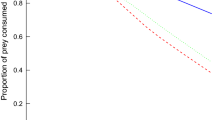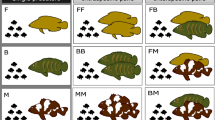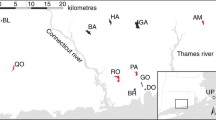Abstract
Trophic cascades have become a dominant paradigm in ecology, yet considerable debate remains about the relative strength of density- (consumptive) and trait-mediated (non-consumptive) effects in trophic cascades. This debate may, in part, be resolved by considering prey experience, which shapes prey traits (through genetic and plastic change) and influences prey survival (and therefore density). Here, we investigate the cascading role of prey experience through the addition of mosquitofish (Gambusia affinis) from predator-experienced or predator-naïve sources to mesocosms containing piscivorous largemouth bass (Micropterus salmoides), zooplankton, and phytoplankton. These two sources were positioned along a competition-defense tradeoff. Results show that predator-naïve mosquitofish suffered higher depredation rates, which drove a density-mediated cascade, whereas predator-experienced mosquitofish exhibited higher survival but fed less, which drove a trait-mediated cascade. Both cascades were similar in strength, leading to indistinguishable top-down effects on lower trophic levels. Therefore, the accumulation of prey experience with predators can cryptically shift cascade mechanisms from density- to trait-mediated.





Similar content being viewed by others
Data availability
The datasets generated during and/or analyzed during the current study are available from the corresponding author on reasonable request.
References
Abrams PA, Matsuda H (1997) Prey adaptation as a cause of predator-prey cycles. Evolution 51:1742–1750. https://doi.org/10.2307/2410997
Arnett HA, Kinnison MT (2017) Predator-induced phenotypic plasticity of shape and behavior: parallel and unique patterns across sexes and species. Curr Zool 63:369–378. https://doi.org/10.1093/cz/zow072
Bassar RD, Marshall MC, López-Sepulcre A et al (2010) Local adaptation in Trinidadian guppies alters ecosystem processes. Proc Natl Acad Sci 107:3616–3621. https://doi.org/10.1073/pnas.0908023107
Bates D, Mächler M, Bolker B, Walker S (2015) Fitting linear mixed-effects models using lme4. J Stat Softw 67:1–48. https://doi.org/10.18637/jss.v067.i01
Beckerman AP, Uriarte M, Schmitz OJ (1997) Experimental evidence for a behavior-mediated trophic cascade in a terrestrial food chain. Proc Natl Acad Sci U S A 94:10735–10738
Bell T (2002) The ecological consequences of unpalatable prey: phytoplankton response to nutrient and predator additions. Oikos 99:59–68
Borer ET, Seabloom EW, Shurin JB et al (2005) What determines the strength of a trophic cascade? Ecology 86:528–537. https://doi.org/10.1890/03-0816
Carpenter SR, Kitchell JF, Hodgson JR et al (1987) Regulation of lake primary productivity by food web structure. Ecology 68:1863–1876. https://doi.org/10.2307/1939878
Daskalov GM, Grishin AN, Rodionov S, Mihneva V (2007) Trophic cascades triggered by overfishing reveal possible mechanisms of ecosystem regime shifts. Proc Natl Acad Sci 104:10518–10523. https://doi.org/10.1073/pnas.0701100104
Dunlop-Hayden KL, Rehage JS (2011) Antipredator behavior and cue recognition by multiple Everglades prey to a novel cichlid predator. Behaviour 148:795–823. https://doi.org/10.1163/000579511X577256
Eilam D (2005) Die hard: a blend of freezing and fleeing as a dynamic defense—implications for the control of defensive behavior. Neurosci Biobehav Rev 29:1181–1191. https://doi.org/10.1016/j.neubiorev.2005.03.027
Fahimipour AK, Anderson KE, Williams RJ (2017) Compensation masks trophic cascades in complex food webs. Theor Ecol 10:245–253
Ferrari MCO, Crane AL, Brown GE, Chivers DP (2015) Getting ready for invasions: can background level of risk predict the ability of naïve prey to survive novel predators? Sci Rep 5:1–7. https://doi.org/10.1038/srep08309
Finke DL, Denno RF (2004) Predator diversity dampens trophic cascades. Nature 429:407–410. https://doi.org/10.1038/nature02554
Frank KT, Petrie B, Choi JS, Leggett WC (2005) Trophic cascades in a formerly cod-dominated ecosystem. Science 308:1621–1623. https://doi.org/10.1126/science.1113075
Fryxell DC, Palkovacs EP (2017) Warming strengthens the ecological role of intraspecific variation in a predator. Copeia 105:523–532. https://doi.org/10.1643/CE-16-527
Fryxell DC, Arnett HA, Apgar TM et al (2015) Sex ratio variation shapes the ecological effects of a globally introduced freshwater fish. Proc R Soc B 282:20151970. https://doi.org/10.1098/rspb.2015.1970
Fryxell DC, Diluzio AR, Friedman MA et al (2016) Cross-habitat effects shape the ecosystem consequences of co-invasion by a pelagic and a benthic consumer. Oecologia 182:519–528. https://doi.org/10.1007/s00442-016-3663-9
Fryxell DC, Wood ZT, Robinson R et al (2019) Eco-evolutionary feedbacks link prey adaptation to predator performance. Biol Lett 15:20190626. https://doi.org/10.1098/rsbl.2019.0626
Gascoigne JC, Lipcius RN (2004) Allee effects driven by predation. J Appl Ecol 41:801–810. https://doi.org/10.1111/j.0021-8901.2004.00944.x
Geraldi NR, Macreadie PI (2013) Restricting prey dispersal can overestimate the importance of predation in trophic cascades. PLoS ONE 8:e55100. https://doi.org/10.1371/journal.pone.0055100
Gonzalez A, Ronce O, Ferriere R, Hochberg ME (2013) Evolutionary rescue: an emerging focus at the intersection between ecology and evolution. Philos Trans R Soc B Biol Sci. https://doi.org/10.1098/rstb.2012.0404
Grabowski JH, Kimbro DL (2005) Predator-avoidance behavior extends trophic cascades to refuge habitats. Ecology 86:1312–1319. https://doi.org/10.1890/04-1216
Griffiths JI, Petchey OL, Pennekamp F, Childs DZ (2018) Linking intraspecific trait variation to community abundance dynamics improves ecological predictability by revealing a growth–defence trade-off. Funct Ecol 32:496–508. https://doi.org/10.1111/1365-2435.12997
Harmon LJ, Matthews B, Des Roches S et al (2009) Evolutionary diversification in stickleback affects ecosystem functioning. Nature 458:1167–1170. https://doi.org/10.1038/nature07974
Hiltunen T, Hairston NG, Hooker G et al (2014) A newly discovered role of evolution in previously published consumer–resource dynamics. Ecol Lett 17:915–923. https://doi.org/10.1111/ele.12291
Hurlbert SH, Mulla MS (1981) Impacts of mosquitofish (Gambusia affinis) predation on plankton communities. Hydrobiologia 83:125–151. https://doi.org/10.1007/BF02187157
Hurlbert SH, Zedler J, Fairbanks D (1972) Ecosystem alteration by mosquitofish (Gambusia affinis) predation. Science 175:639–641. https://doi.org/10.1126/science.175.4022.639
Ingram T, Svanbäck R, Kraft NJB et al (2012) Intraguild predation drives evolutionary niche shift in threespine stickleback. Evolution 66:1819–1832. https://doi.org/10.1111/j.1558-5646.2011.01545.x
Johnson DM (1991) Behavioral ecology of larval dragonflies and damselflies. Trends Ecol Evol 6:8–13. https://doi.org/10.1016/0169-5347(91)90140-S
Kasada M, Yamamichi M, Yoshida T (2014) Form of an evolutionary tradeoff affects eco-evolutionary dynamics in a predator–prey system. Proc Natl Acad Sci 111:16035–16040. https://doi.org/10.1073/pnas.1406357111
Kimbro DL, Grosholz ED, Baukus AJ et al (2009) Invasive species cause large-scale loss of native California oyster habitat by disrupting trophic cascades. Oecologia 160:563–575. https://doi.org/10.1007/s00442-009-1322-0
Křivan V, Schmitz OJ (2004) Trait and density mediated indirect interactions in simple food webs. Oikos 107:239–250. https://doi.org/10.1111/j.0030-1299.2004.12695.x
Langerhans RB (2009) Trade-off between steady and unsteady swimming underlies predator-driven divergence in Gambusia affinis. J Evol Biol 22:1057–1075
Langerhans RB, Makowicz AM (2009) Shared and unique features of morphological differentiation between predator regimes in Gambusia caymanensis. J Evol Biol 22:2231–2242. https://doi.org/10.1111/j.1420-9101.2009.01839.x
Langerhans RB, Layman CA, Shokrollahi AM, DeWitt TJ (2004) Predator-driven phenotypic diversification in Gambusia affinis. Evolution 58:2305–2318. https://doi.org/10.1111/j.0014-3820.2004.tb01605.x
Lönnstedt OM, McCormick MI, Meekan MG et al (2012) Learn and live: predator experience and feeding history determines prey behaviour and survival. Proc R Soc Lond B Biol Sci 279:2091–2098. https://doi.org/10.1098/rspb.2011.2516
Magurran AE (1986) Predator inspection behaviour in minnow shoals: differences between populations and individuals. Behav Ecol Sociobiol 19:267–273. https://doi.org/10.1007/BF00300641
Magurran AE, Seghers BH, Carvalho GR, Shaw PW (1992) Behavioural consequences of an artificial introduction of guppies (Poecilia reticulata) in N. Trinidad: evidence for the evolution of anti-predator behaviour in the wild. Proc Biol Sci 248:117–122
Mansfield S, Mcardle BH (1998) Dietary composition of Gambusia affinis (Family Poeciliidae) populations in the northern Waikato region of New Zealand. N Z J Mar Freshw Res 32:375–383. https://doi.org/10.1080/00288330.1998.9516832
McCann K, Hastings A, Huxel GR (1998) Weak trophic interactions and the balance of nature. Nature 395:794–798. https://doi.org/10.1038/27427
McCormick MI, Holmes TH (2006) Prey experience of predation influences mortality rates at settlement in a coral reef fish, Pomacentrus amboinensis. J Fish Biol 68:969–974. https://doi.org/10.1111/j.0022-1112.2006.00982.x
Mooney KA, Halitschke R, Kessler A, Agrawal AA (2010) Evolutionary trade-offs in plants mediate the strength of trophic cascades. Science 327:1642–1644. https://doi.org/10.1126/science.1184814
Neutel A-M, Heesterbeek JAP, de Ruiter PC (2002) Stability in real food webs: weak links in long loops. Science 296:1120–1123. https://doi.org/10.1126/science.1068326
Ousterhout BH, Graham SR, Hasik AZ et al (2018) Past selection impacts the strength of an aquatic trophic cascade. Funct Ecol 00:1–9. https://doi.org/10.1111/1365-2435.13102
Paine RT (1980) Food webs: linkage, interaction strength and community infrastructure. J Anim Ecol 49:667–685. https://doi.org/10.2307/4220
Palkovacs EP, Wasserman BA, Kinnison MT (2011) Eco-evolutionary trophic dynamics: loss of top predators drives trophic evolution and ecology of prey. PLoS ONE 6:e18879. https://doi.org/10.1371/journal.pone.0018879
Palkovacs EP, Kinnison MT, Correa C et al (2012) Fates beyond traits: ecological consequences of human-induced trait change. Evol Appl 5:183–191. https://doi.org/10.1111/j.1752-4571.2011.00212.x
Peacor SD, Werner EE (2001) The contribution of trait-mediated indirect effects to the net effects of a predator. Proc Natl Acad Sci 98:3904–3908. https://doi.org/10.1073/pnas.071061998
Peacor SD, Peckarsky BL, Trussell GC, Vonesh JR (2013) Costs of predator-induced phenotypic plasticity: a graphical model for predicting the contribution of nonconsumptive and consumptive effects of predators on prey. Oecologia 171:1–10. https://doi.org/10.1007/s00442-012-2394-9
Polis GA, Sears ALW, Huxel GR et al (2000) When is a trophic cascade a trophic cascade? Trends Ecol Evol 15:473–475. https://doi.org/10.1016/S0169-5347(00)01971-6
Preisser EL, Bolnick DI (2008a) When predators don’t eat their prey: nonconsumptive predator effects on prey dynamics. Ecology 89:2414–2415. https://doi.org/10.1890/08-0522.1
Preisser EL, Bolnick DI (2008b) The many faces of fear: comparing the pathways and impacts of nonconsumptive predator effects on prey populations. PLoS ONE 3:e2465. https://doi.org/10.1371/journal.pone.0002465
Preisser EL, Bolnick DI, Grabowski JH (2009) Resource dynamics influence the strength of non-consumptive predator effects on prey. Ecol Lett 12:315–323. https://doi.org/10.1111/j.1461-0248.2009.01290.x
Pyke GH (2008) Plague minnow or mosquito fish? A review of the biology and impacts of introduced Gambusia species. Annu Rev Ecol Evol Syst 39:171–191. https://doi.org/10.1146/annurev.ecolsys.39.110707.173451
R Core Team (2016) R: a language and environment for statistical computing. R Foundation for Statistical Computing, Vienna, Austria
Reznick DA, Bryga H, Endler JA (1990) Experimentally induced life-history evolution in a natural population. Nature 346:357–359. https://doi.org/10.1038/346357a0
Ripple WJ, Estes JA, Schmitz OJ et al (2016) What is a trophic cascade? Trends Ecol Evol 31:842–849. https://doi.org/10.1016/j.tree.2016.08.010
Romare P, Hansson L-A (2003) A behavioral cascade: top-predator induced behavioral shifts in planktivorous fish and zooplankton. Limnol Oceanogr 48:1956–1964. https://doi.org/10.4319/lo.2003.48.5.1956
Schmitz OJ, Beckerman AP, O’Brien KM (1997) Behaviorally mediated trophic cascades: effects of predation risk on food web interactions. Ecology 78:1388–1399. https://doi.org/10.1890/0012-9658(1997)078[1388:BMTCEO]2.0.CO;2
Schmitz OJ, Krivan V, Ovadia O (2004) Trophic cascades: the primacy of trait-mediated indirect interactions. Ecol Lett 7:153–163. https://doi.org/10.1111/j.1461-0248.2003.00560.x
Seghers BH (1974) Schooling behavior in the guppy (Poecilia reticulata): an evolutionary response to predation. Evolution 28:486–489. https://doi.org/10.2307/2407174
Shurin JB, Borer ET, Seabloom EW et al (2002) A cross-ecosystem comparison of the strength of trophic cascades: Strength of cascades. Ecol Lett 5:785–791. https://doi.org/10.1046/j.1461-0248.2002.00381.x
Sih A, Bolnick DI, Luttbeg B et al (2010) Predator–prey naïveté, antipredator behavior, and the ecology of predator invasions. Oikos 119:610–621. https://doi.org/10.1111/j.1600-0706.2009.18039.x
Sommer U, Sommer F, Santer B et al (2003) Daphnia versus copepod impact on summer phytoplankton: functional compensation at both trophic levels. Oecologia 135:639–647. https://doi.org/10.1007/s00442-003-1214-7
Start D (2018) Predator macroevolution drives trophic cascades and ecosystem functioning. Proc R Soc B Biol Sci 285:20180384. https://doi.org/10.1098/rspb.2018.0384
Stearns SC (1989) Trade-offs in life-history evolution. Funct Ecol 3:259–268. https://doi.org/10.2307/2389364
Storm J, Lima SL (2010) Mothers forewarn offspring about predators: a transgenerational maternal effect on behavior. Am Nat 175:382–390. https://doi.org/10.1086/650443
Strong DR (1992) Are trophic cascades all wet? Differentiation and donor-control in speciose ecosystems. Ecology 73:747–754. https://doi.org/10.2307/1940154
Templeton CN, Shriner WM (2004) Multiple selection pressures influence Trinidadian guppy (Poecilia reticulata) antipredator behavior. Behav Ecol 15:673–678. https://doi.org/10.1093/beheco/arh065
Tessier AJ, Woodruff P (2002) Cryptic trophic cascade along a gradient of lake size. Ecology 83:1263–1270. https://doi.org/10.1890/0012-9658(2002)083[1263:CTCAAG]2.0.CO;2
Trussell GC, Ewanchuk PJ, Matassa CM (2006) Habitat effects on the relative importance of trait- and density-mediated indirect interactions. Ecol Lett 9:1245–1252. https://doi.org/10.1111/j.1461-0248.2006.00981.x
United States Bureau of Land Management, U.S. Fish and Wildlife Service (1985) Management plan for Fish Slough, an area of critical environmental concern: a cooperative management program
US Fish and Wildlife Service (2005) Final economic analysis of critical habitat designation for the fish slough milk-vetch
Vilhunen S, Hirvonen H (2003) Innate antipredator responses of Arctic charr (Salvelinus alpinus) depend on predator species and their diet. Behav Ecol Sociobiol 55:1–10. https://doi.org/10.1007/s00265-003-0670-8
Walsh MR, Reznick DN (2008) Interactions between the direct and indirect effects of predators determine life history evolution in a killifish. Proc Natl Acad Sci 105:594–599. https://doi.org/10.1073/pnas.0710051105
Walsh MR, DeLong JP, Hanley TC, Post DM (2012) A cascade of evolutionary change alters consumer-resource dynamics and ecosystem function. Proc R Soc Lond B Biol Sci rspb20120496. https://doi.org/10.1098/rspb.2012.0496
Walsh JR, Carpenter SR, Zanden MJV (2016) Invasive species triggers a massive loss of ecosystem services through a trophic cascade. Proc Natl Acad Sci 113:4081–4085. https://doi.org/10.1073/pnas.1600366113
Wood ZT, Palkovacs EP, Kinnison MT (2018) Eco-evolutionary feedbacks from non-target species influence harvest yield and sustainability. Sci Rep 8:6389. https://doi.org/10.1038/s41598-018-24555-0
Wood ZT, Fryxell DC, Robinson RR et al (2019) Phenotypic and community consequences of captive propagation in mosquitofish. J Appl Ecol 56:1538–1548. https://doi.org/10.1111/1365-2664.13391
Wund MA, Baker JA, Golub JL, Foster SA (2015) The evolution of antipredator behaviour following relaxed and reversed selection in Alaskan threespine stickleback fish. Anim Behav 106:181–189. https://doi.org/10.1016/j.anbehav.2015.05.009
Yamamichi M, Miner BE (2015) Indirect evolutionary rescue: prey adapts, predator avoids extinction. Evol Appl 8:787–795. https://doi.org/10.1111/eva.12295
Yoshida T, Hairston NG, Ellner SP (2004) Evolutionary trade-off between defence against grazing and competitive ability in a simple unicellular alga, Chlorella vulgaris. Proc Biol Sci 271:1947–1953. https://doi.org/10.1098/rspb.2004.2818
Acknowledgements
The authors thank Bruno Zicarelli and Joseph Centoni for help with data collection. The students in the Spring 2016 Freshwater Ecology Lab course at UC Santa Cruz helped with mesocosm setup and weekly mosquitofish counts. Hamish Grieg, Amanda Klemmer, Tim Waring, and Isaac SN Shepard provided feedback on data analysis and interpretation.
Funding
This work was funded by the National Science Foundation (DEB 1457333 and DEB 1457112), UC Santa Cruz, and the Maine Agricultural and Forest Experiment Station. ZTW received support through the University of Maine Janet Waldron Fellowship Program, DCF received supported through the NSF Graduate Research Fellowship Program, and EPP received support through the NOAA Cooperative Institute for Marine Ecosystems and Climate.
Author information
Authors and Affiliations
Contributions
DCF, EPP, and MTK designed the experiment. DCF, EPP, ZTW, MTK, KSS, and ERM carried out the experiment and collected the data. ZTW performed data analyses and led the writing of the manuscript.
Corresponding author
Ethics declarations
Conflict of interest
The authors declare no conflicts of interest.
Additional information
Communicated by Jonathan Shurin.
Electronic supplementary material
Below is the link to the electronic supplementary material.
Rights and permissions
About this article
Cite this article
Wood, Z.T., Fryxell, D.C., Moffett, E.R. et al. Prey adaptation along a competition-defense tradeoff cryptically shifts trophic cascades from density- to trait-mediated. Oecologia 192, 767–778 (2020). https://doi.org/10.1007/s00442-020-04610-2
Received:
Accepted:
Published:
Issue Date:
DOI: https://doi.org/10.1007/s00442-020-04610-2




